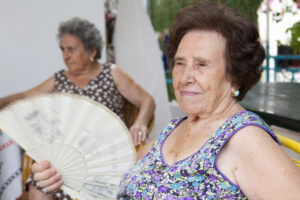
In fact, studies have shown that exposure to excessive heat in older adults can significantly increase the risk of heart attack and death. So, if you’re an older adult, it’s essential to take steps to protect yourself from the dangers of heat exposure.
When the temperature and humidity rise, so does the heart rate. The heart works harder in hot weather, trying to cool itself by shifting blood from major organs to underneath the skin. This shift causes the heart to pump more blood, putting it under significantly more stress.
To avoid this, it is essential to avoid dehydration. Adequate hydration helps the heart pump blood through the blood vessels to the muscles more easily and helps the muscles work efficiently. When the body is properly hydrated, the heart doesn’t have to work as hard and is less likely to be strained. So, next time you’re headed out into the heat, make sure to drink lots of water.
“Staying hydrated is key. It is easy to get dehydrated even if you don’t think you’re thirsty,” said Donald M. Lloyd-Jones, M.D., Sc.M., FAHA, president of the American Heart Association and chair of the department of preventive medicine. “Drink water before, during and after going outside in hot weather. Don’t wait until you feel thirsty. And the best way to know if you are getting enough fluid is to monitor your urine output and make sure the urine color is pale, not dark or concentrated.”
Heart Health in Extreme Weather
Research published in Circulation, the flagship journal of the American Heart Association, found that cardiovascular-related deaths may double or triple when temperatures reach extremes. Extreme heat is reported as an average daily temperature of 109 degrees Fahrenheit. A separate report featured at the American Stroke Association’s International Stroke Conference suggested that the more temperatures fluctuate during the summer, the more severe strokes can be.
This research adds to mounting evidence of how weather and environment can affect our health, especially cardiovascular health. If you are over 50, have high blood pressure, have had a stroke or heart disease, or are overweight, taking special precautions in the heat is vital to protect your health.
Ways you can do this include staying out of the sun during peak hours, drinking plenty of fluids, wearing loose-fitting clothing, and using air conditioning or fans whenever possible. Following these tips can help keep your heart healthy all summer long.
Keeping the heart strong and healthy is vital for enjoying a high quality of life as you age. Heart Rescue was designed to help support and promote cardiovascular health using a variety of ingredients, including omega-3 fatty acids, CoQ10, magnesium, and hawthorn extract. This formula’s health benefits can help strengthen the heart muscle, support circulation, and help reduce the risk of cardiovascular disease.